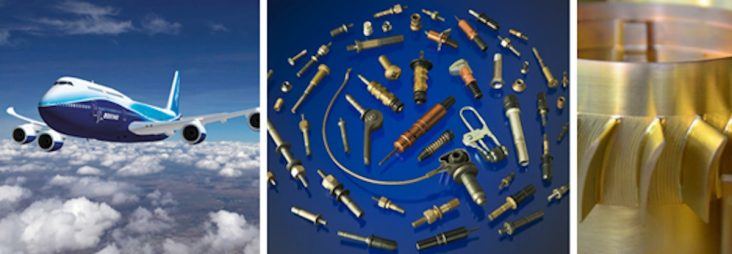Aerospace manufacturer to close plant in Fort Smith metro, 80 jobs could be lost
by October 3, 2016 4:13 pm 461 views

Mac Fasteners Inc., a high-volume manufacturing of screws and bolts for the aerospace industry, plans to shut down its 25,000-square foot plant in Paris, Ark., and consolidate that facility into the company’s larger operations in Ottawa, Kan.
Mac Fasteners is a division of Bloomington Hills, Mich.-based TriMas Corp., a publicly-traded, global manufacturer of engineer products that has undergone significant changes to its operations in the past two years, including the sudden resignation of its former president and CEO in July and the spin-off of its former Cequent towing division a year ago.
TriMas officials quietly announced last week the facility consolidation to more efficiently utilize existing locations and better serve its customers. Besides merging the Paris aerospace aftermarket manufacturing plant into Mac Fasteners’ Kansas headquarters, the company also consolidated two engineering component plants in Tulsa, Okla., into one facility. TriMas officials did not immediately respond to media inquiries from Talk Business & Politics concerning the companywide consolidations, including the employee count at the Paris manufacturing facility.
TriMas offered few details of the closing of the Paris plant, except to say that the impacted facilities would continue operations through the end of 2016 and early 2017 until “the consolidation efforts are finalized.” The Paris plant, which is in affiliate of the Kansas operation, at last count had a growing workforce of 80 employees where workers there produced more than 200 million fasteners in 2014 with plans to increase production in 2015.
The closing is certainly not good news for the struggling Fort Smith metro manufacturing sector. The U.S. Bureau of Labor Statistics estimates metro manufacturing employment at 17,900 in August, unchanged compared to July and better than the 17,700 in August 2015. However, sector employment is down 6.7% from just five years ago when August 2011 employment was 19,200, and is well off peak employment of 31,000 set in August 1999.
According to the regulatory filings with the federal Securities and Exchange Commission (SEC), Mac Fasteners operates out of two adjacent manufacturing facilities in Ottawa, Kan., that total more than 53,000 square feet and an off-site drilling location comprising 2,000 square feet.
Company officials said they will provide more information related to the consolidation activities on its third quarter earnings call, including expected one-time costs to associated with plant closings in Arkansas, Tulsa and overseas.
On the international front, the company recently opened a packaging plant in San Miguel de Allende, Mexico, and is exploring options to improve the performance of another manufacturing facility in Wolverhampton, United Kingdom.
“A key tenet to the TriMas business model is optimizing our manufacturing footprint, ensuring we continuously adapt to changing markets, while remaining responsive to our customers,” Thomas Amato, TriMas president and CEO, said in a news release. “We believe these facility rationalization actions are another positive step toward streamlining our infrastructure and driving improved performance.”
PREVIOUS BUSINESS MOVES
TriMas’ quarterly 10Q filing and other securities filings offers additional details and shows a company attempting to weather the ongoing downturn in the U.S. manufacturing sector.
TriMas is a diversified, global manufacturer of engineered products with nearly 4,000 employees in 13 countries. The company primarily operates through four divisions, including packaging, aerospace, energy and engineer components. Just two years ago, the company had nearly 7,000 employees working in six divisions spread across an expansive global footprint of 19 countries.
TriMas completed in June 2015 the tax-free $500 million spin-off of its Cequent businesses to TriMas shareholders as a newly formed company named Horizon Global Corp. That company manufacturers towing and trailer accessories and now has 2,800 employees in more than 20 cities across the globe.
A year ago, shortly after the Cequent spin-off, TriMas announced a companywide financial Improvement plan to improve profitability, cash flow conversion and operational efficiency, and enhance shareholder value.
“These actions represent an acceleration of the margin enhancement and business improvement initiatives we have been pursuing over the past several quarters, particularly with respect to our energy market-facing businesses,” David Wathen, the the TriMas CEO said in September 2015. “We expect this broad-based set of cost reductions to position us for improvements in 2016 – to drive profitable growth, improve margin performance and increase free cash flow.”
But Wathen abruptly resigned in late July and was replaced by Amato after net sales for the Michigan manufacturer fell by $42.8 million, 9.5%, to $406.2 million in the first half of 2016, compared with $449 for the first half of 2015.
In the company’s aerospace division, which includes the company’s Arkansas plant that makes nuts and bolts for commercial and military aircraft, net sales in the first half of 2016 decreased by $4.4 million, or 4.9%, to $84.6 million, compared to $89 in the first six months ended June 30, 2015.
Gross profit within the aerospace division declined by $11.2 million to $19.7 million, or 23.2% of sales. Company officials said nearly $4.6 million in losses were a result of manufacturing inefficiencies, lower sales volumes and other additional production costs.
